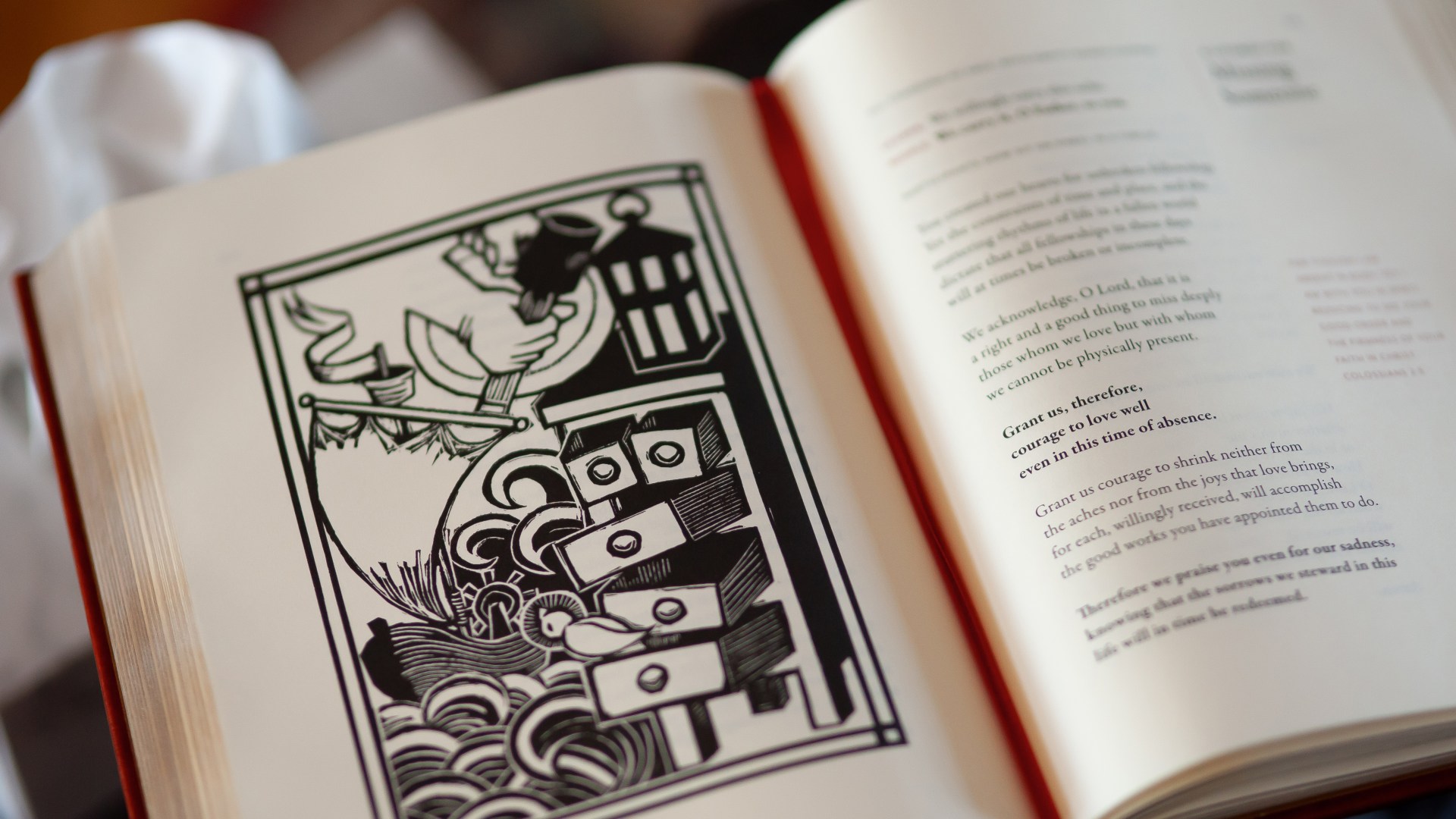Douglas McKelvey has been writing short prayers for years. Formerly a lyricist for artist Charlie Peacock and other Christian bands, McKelvey was also involved in the early work of Art House America, a self-described “artistic hub” and nonprofit founded by Peacock and led by Christian creatives such as Sara Groves.
In 2017, McKelvey published a book of daily liturgies called Every Moment Holy, Vol. 1 through a creative collective called Rabbit Room founded by singer-songwriter Andrew Peterson. McKelvey’s recently published second volume is filled with liturgies for grief, death, and dying, released 12 months after the coronavirus pandemic swept the United States and killed hundreds of thousands. CT interviewed McKelvey about how his latest volume and the past year’s events shaped his beliefs on death and dying.
What was your inspiration for Every Moment Holy?
I was working on a science fiction novel but kind of felt like I was spinning my wheels. A lot of days I just wasn’t making any progress. And at a certain point, I thought, I really need a prayer that I could pray when I sit down in the morning to work—to write something that would reorient me in terms of my relationship to my Creator and my relationship to my craft and whatever gifts I’m a steward of. So, I wrote this prayer and called it a liturgy for fiction writers.
 Photo by Lancia E. Smith
Photo by Lancia E. SmithThat was a couple of months before a conference where I was speaking with Andrew Peterson and author Heidi Johnston. I emailed that prayer for fiction writers to Andrew, and he responded pretty quickly and said, “Hey, this is great, but man, I wish I had a liturgy for beekeeping” and a couple of other things.
That was the immediate moment where the lightbulb just turned on and I realized there’s actually something here that might really be of service to the body of Christ—to create a collection of prayers that that would help people to unpack moment by moment in their lives what it might mean that God is present and active in this moment. It’s his pleasure to work in and through us as our hearts are yielded to that process moment by moment. To look at different moments of our lives in light of Scripture and say, okay, if we’re changing a diaper, how does that touch on eternity? How is that tied to the advancing kingdom of God, to the coming new creation?
What would you say is the value specifically in the Every Moment Holy liturgies?
I find that it is helpful to define terms because people can mean very different things when they use the word liturgy because there is the overarching meaning of the word, which is just the order and content of a worship service. Then there’s the sense of the word that means those rhythms of our lives, those repeated practices that have the power to shape our hearts into something that better reflects the image of Christ or to misshape them away from that. So there are negative liturgies as well as positive liturgies.
An example that I’ve used before is that, if I am habitually posting dozens of selfies every day, there’s nothing in and of itself that’s inherently wrong with posting selfies. But if that becomes this repeated rhythm in my life, then it’s likely that it could begin to shape me, to shape my heart, or misshape my heart toward caring an awful lot about what other people think of me.
And that could be an overriding and consuming and shaping factor in my life as opposed to if I have the regular practice of taking walks in the woods and taking time to pause and consider the creation and the beauty that God has created there. Well, there’s nothing that is inherently righteous about taking a walk in the woods, but that practice is going to be much more likely to draw my heart to the beauty of my Creator.
With the Every Moment Holy project, my hope has been that these will be liturgical in the sense that individuals or families or small groups or churches would be able to find a number of the prayers in these books that they could incorporate naturally into the rhythm of their lives. There’s a liturgy for the first hearth fire of the season, or if a family incorporates the daily meal prayers and liturgies, that the theological truths that are contained in those would be things that over time would shape and frame the thinking and theology for children and adults.
The second volume is coming out during Lent and after a really hard year that reminded us of our mortality in a lot of ways.
Yeah, it took two years to write volume two. It predated COVID. Through most of 2020, I was continuing to write, and the events that were happening were continuing to shape the content of it. I think one of those was a liturgy for a time of widespread suffering. Even more than current events shaping these there was the absolutely necessary involvement of probably at least 150 people that I corresponded with during that time who either were navigating grief or were facing their own mortality during that season.
For the believer, hope is that is the common theme that runs through all of the death, the dying, the suffering and the grief.
There was a woman who had just lost her husband and her seven- and nine-year-old daughters. A mutual acquaintance contacted me to ask if I had anything that might be appropriate for the memorial service. So I sent them a couple of things, and then this woman contacted me within the next couple of weeks to thank me for that. And then we just began this correspondence where she would look at prayers I had written and would give me her honest feedback on what was accurately articulating what was on her heart and what I might be missing on some of those things or things I was completely clueless to. There were a number of heavier topics that it was just so crucial to have this community of grieving people weighing in and ultimately signing off.
Based on the dedication to Jay Swartzendruber, it sounds like you also had some personal experience with grief this year.
Well, yeah, Jay has been a friend for many years. The afternoon that I was finishing the final edits on this book, I got a phone call from another friend giving me the news that Jay had just died unexpectedly earlier that day. So for the next couple of hours, I continued to work on the manuscript, but it was through tears. But it was also with such an assurance of the reality of the things I had just spent two years writing about. And knowing that it was okay to live in that tension of feeling great grief, but also having a real sense of celebration and hope at the same time. And those things don’t contradict each other for a follower of Christ. Those things are completely interwoven and intermingled, and we should allow ourselves to feel both fully at the same time.
That’s powerful. Do you have a specific liturgy in volume 2 that is most meaningful to you?
Yeah. In volume 1 the book closes with the liturgy of praise to the King of creation. It’s this exuberant worshipful song of a prayer just praising Christ. The final prayer [in volume 2] is a liturgy of praise to Christ who conquered death. I think that’s become one of the most meaningful ones for me. I was saving it for the end because I recognized it as something that I needed after having spent two years wrestling through these topics of death and mortality and grieving.
I wanted to end the experience of writing the book with letting all of that be summed up in an expression of the great hope that we have and turn all of that into worship of Christ. Because he is the one who has conquered death, who has given us this hope that is so powerful that it undercuts, transcends, and ultimately transforms our dying and the grief that we do encounter in this life. That’s one that definitely comes to mind as a contender for the one that’s most meaningful to me.
There’s a prayer in the new book giving voice to the costly confession. When everything is going well for us, it doesn’t really ask much of us to give thanks to God or to declare his worthiness. But in those times when life is a struggle or in the most extreme scenario when we are facing our own imminent death, what does it mean at that point to say to God, “Even so, you are worthy of all glory, all praise whether I live or die”? The collective suffering that we’ve experienced over the last year does put us in a place where it’s more sobering and it’s more costly to make those kinds of declarations.
Speaking of formation, how has your view on death and dying grief been formed? And what is your hope for this specific volume coming out in 2021?
The answer to both of those questions is probably the same answer. I did a lot of reading of books written by people chronicling their own grief process or theological works about death and dying and grief. I began to realize through all of that was that the church, at least in the West, no longer has a robust theology of dying based on Scripture. And there are a number of reasons for that. One of them, I think, has to do with medical advances and the fact that we no longer find ourselves in a time and place when most of us have experienced a number of deaths firsthand growing up.
So often our experiences around death and grief are awkward because we’re not prepared. We don’t know how to really serve those who are dying. We don’t know how to mourn with those who are mourning. And we don’t know how to navigate our own dying when each of us reaches that season. Part of my hope for what volume 2 might do—in addition to serving individuals who are walking through these seasons—is to be a catalyst for churches to begin to have these conversations and to develop a more robust theology of dying.
Part of what I think we’ve lost is an understanding of how we are crucified with Christ. At the moment we begin the journey as followers of Jesus, we are learning to die to ourselves. We’re baptized into his death. Baptism is the symbol of us who we were dying, of laying down our own desires. And then as we follow him throughout the rest of our lives, it’s this ongoing process of sanctification, of becoming more and more like him. So much of that has to do with continuing to lay down our own dreams, our own desires.
Our last crossing of the valley of the shadow of death is an expected and final part of that journey. It’s the point where we at last will willingly or unwillingly lay down all of those final things that we’ve still been carrying and fully embrace the life that we have in him. That’s not to say that death is not unnatural and an enemy. Scripture tells us that it’s the last enemy that will be destroyed, but it will be destroyed. And that’s great cause for rejoicing. That’s one element of that theology of dying that I hope that the church in the West can reclaim in a more holistic way that’s not just relegated to a funeral service.
For the believer, hope is that is the common theme that runs through all of the death, the dying, the suffering and the grief. And of those three—death, grief, and hope—hope is the only one that is eternal. Its fulfillment is eternal.










